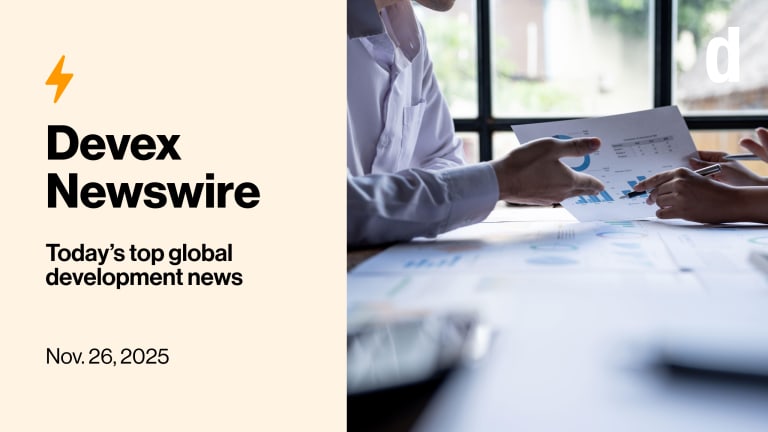
This is a preview of Newswire
Sign up to this newsletter for an inside look at the biggest stories in global development, in your inbox daily.
The Intergovernmental Panel on Climate Change released a major report today on the physical science of global warming — one that says there is no scientific doubt that humans are causing climate change.
This IPCC report is part of a larger collection that will provide an update on the state of the climate emergency. The results are grim: Climate change is accelerating faster than expected and that the timeline for preventing warming beyond 1.5 degrees Celsius will arrive a decade earlier than the IPCC previously found, by the early 2030s. The report will also cover climate adaptation and dedicate a third of the document to the risks faced by specific regions, accompanied by an interactive atlas online.
“The most important climate science update for almost a decade shows there is a path to avoiding climate catastrophe, but only through immediate, deep, and sustained emissions reductions. This may be our final warning,” said Dr. Simon Bradshaw of the Climate Council of Australia in a statement.
These alarming conclusions make clear that global development and climate change are fully inseparable challenges, and they raise the stakes for COP 26 in November at Glasgow to deliver for lower-income countries.
In addition to even louder calls for high-income countries to fulfill their promise of providing $100 billion annually to lower-income countries in climate finance, the fact that climate impacts are growing stronger and faster adds urgency to the need for finance that supports adaptation — which is meant to be half of the climate finance total.
“At present [high-income countries] spend only around $20 billion a year out of the promised $50 billion. That is a disgrace, and should be dealt with as a matter of priority before COP26,” Chikondi Chabvuta, southern Africa region advocacy adviser at CARE, said in a statement.
While some fossil fuel companies have so far managed to position themselves as part of the solution, those efforts are falling under heightened scrutiny. The Biden administration plans to push multilateral development banks even harder on fossil fuels and increase their climate finance targets.
Last week, after an Exxon lobbyist was secretly recorded by Greenpeace explaining that the company’s climate advocacy is disingenuous, Exxon was suspended from the Climate Leadership Council, a group that seeks to unite corporations and conservation groups.
ICYMI: Our Devex Pro special report, “The Climate Finance Challenge,” tackles the link between financing and global climate goals.
The greater good
“We should not be thinking about it as helping other countries. We should be thinking about this within the framework of global public goods.”
— Tharman Shanmugaratnam, senior minister of SingaporeExperts advising the G-20 put the cost of preparing for the next pandemic at no less than $75 billion over the next five years. Some of them also want to see international financial institutions shift their portfolios to put global public goods at the core of their mandates, Shabtai Gold reports.
Read: Multilateralism is needed to prepare for next pandemic, experts say
One-upmanship
China’s President Xi Jinping announced last week that the country will donate $100 million to COVAX — and provide 2 billion COVID-19 vaccine doses to the world. He did not specify whether the latter would be provided free of charge.
The Chinese government has faced criticism for selling — instead of donating — doses to the global vaccine sharing platform. In July, USAID Administrator Samantha Power called that decision “appalling.”
As the U.S. and China both try to position themselves as leaders in the global fight against COVID-19, their vaccine stocks have taken on diplomatic, as well as humanitarian, value. U.S. lawmakers who criticize China for profiting off of vaccine sales also want to see tiny American flags pasted to every vial the U.S. government donates to ensure recipients know where they’re coming from.
ICYMI: The COVAX shortage of AstraZeneca has forced many countries to be creative about how to administer second doses.
+To get more updates on global health, COVID-19 vaccine supply, and equity, sign up for Devex CheckUp, the must-read weekly newsletter for exclusive global health news and insider insights.
Smoke and mirrors
“While some U.N. agencies, such as the World Health Organization, uphold strong policies against interacting with tobacco companies and their front groups, others do not,” writes Leonce Dieudonné Sessou, executive secretary at the African Tobacco Control Alliance.
One example of an organization with ties to the tobacco industry that also participates in U.N.-related discussions is the Eliminating Child Labour in Tobacco Growing Foundation, or ECLT, a member of the UN Global Compact.
“Its funding, as well as 13 of 14 board members in 2020 still come directly from the industry,” Sessou writes.
Opinion: Looking away will not end child labor in tobacco fields
In other news
The chief negotiator for Yemen’s Iran-aligned Houthi movement said Sunday that peace talks with the U.N.’s new special envoy for Yemen would be futile unless airports and ports were opened to humanitarian aid. [Reuters]
Though guidelines differ from country to country, there are increasing calls to vaccinate pregnant women against COVID-19. [Devex]
Dozens of Chinese officials have been fired or punished over accusations that they failed to respond properly to the latest surge of the coronavirus in the country. [AP]
Sign up to Newswire for an inside look at the biggest stories in global development.








